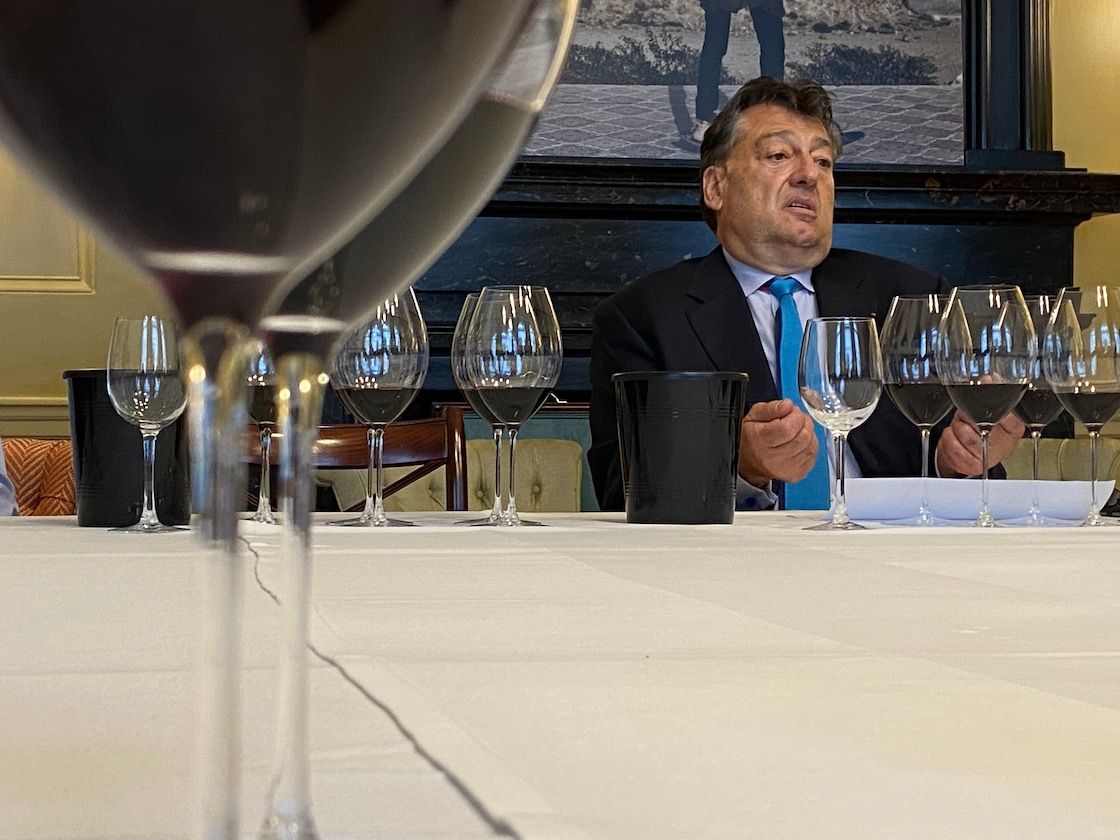“I first got to understand Colombo’s wines as ideal Cornas for sommeliers when Vincent Pastorello, then head of wine for The Dorchester group, took me on a buying trip in the Rhône six years ago,” writes Dean.
There are not many winemakers from the Rhône who will compare a current vintage to 2002 but then there are not many winemakers as outspoken as Jean-Luc Colombo.
For those who didn’t know 2002 is pretty much a swear word in the Rhône – it is the worst vintage in living memory (certainly since 1993) and, by Robert Parker’s estimation, produced “appalling” wines in the Southern Rhône and “average’ in the North. Sat in the hallowed halls of Pall Mall’s Travellers Club, Colombo is in London to show me his excellent Cornas 2020s, but cannot help talking about the 2021 vintage that his team are trying to bring in.
“It is a disaster,” says Colombo, “Frost, rain, fires… in 2021 you need to know how to make wine, this week is rain, next week is rain.”
At an event I attended a couple of weeks later Michel Chapoutier, who Colombo still does some consultancy for, was in town to launch his 2020s and ended up talking about the 2021 vintage, nay selling it, as if he too is expecting it to be a washout. Hopefully the 2021 vintage will pull out of its nosedive but, whatever the case, it puts a keener focus on getting hold of the 2020 wines while you can, as supplies from the Rhône (and many other major French regions) will be hit next year and possibly the following year as well.
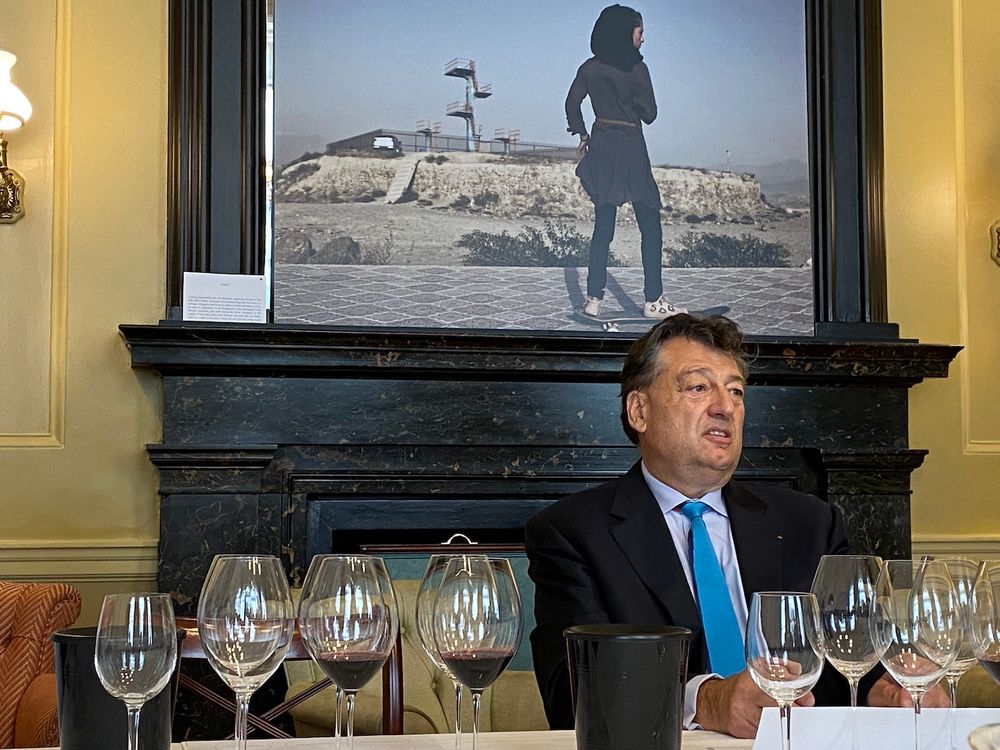
Jean-Luc Colombo, The Travellers Club, London, September 2021 (the image behind was unrelated and part of a photographic exhibition)
The man who would be king of Cornas
Although Colombo makes wine throughout the Rhône and Provence, both as a vigneron and as a negociant, he is best know for his Cornas.
Putting the 2021 vintage aside, the entire Northern Rhône has had a run of good to very good vintages since 2015. The 2020 vintage is no exception – although it still has another year in barrel all the indications are here that the reds are going to be deep, sophisticated and complex and quite classic in style. Colombo likens 2020 to 2018 and 2019, along with some comparisons to the more classic vintages of 2011 and 2001. The purity and power of the Cornas Terres Brûlées 2020 cask sample that we taste first immediately confirms his opinion and the rest of the new wines that we taste are all equally as good if not better.
Much has been said and printed, of course, about Jean-Luc Colombo’s influence on the wines of Cornas. When he started buying vineyards in the late 1980s, Cornas wines did not generally have a high reputation, with brett and poor cellar hygiene both common. Colombo is a trained pharmacist and his winemaking style then was to be very ‘hands-on’ (as oppose to non-intervention), advocating the prodigious use of new wood, destemming and spotlessly-clean cellars, when these were not in vogue.
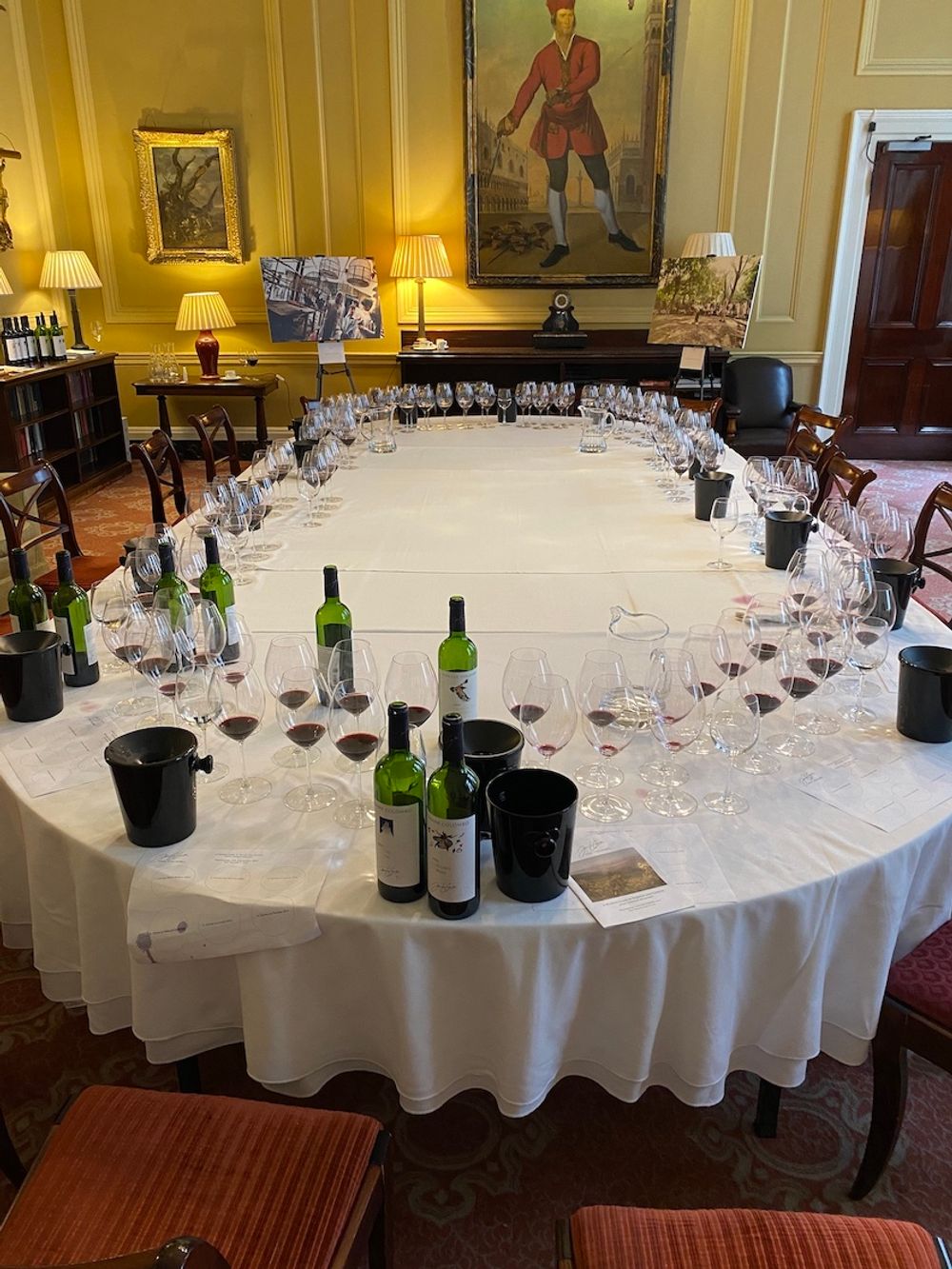
After the tasting
His earlier style has been criticised in the past for being too international, Parker-focused and polished, but his wines nowadays do not seem so out of kilter; his style has changed somewhat using 5-10% whole bunch, green harvesting, non-filtration and working without irrigation, while Cornas as an appellation has been influenced by him and generally cleaned up its act. The wines he is making in 2020 are approachable young, (some feat given the prodigious tannins of Cornas) and are dependable as they mature which is also not always the case with some of the more in-vogue producers whose wines can unexpectedly fall short with age.
This much was proved to me when I first got to understand Colombo’s wines as ideal Cornas for sommeliers. Vincent Pastorello, then head of wine for The Dorchester group, took me on a buying trip in the Rhône six years ago. A big fan of Colombo’s wines Pastorello made me try the latest vintages in Cornas and then the same cuvées with age on them, paired with the cooking of Alain Ducasse back at the Dorchester. And they really were impressive, speaking of the Cornas terroir, albeit in a ‘clean’ and pure style.
As the godson of Paul Bocuse, Jean-Luc Colombo has always been alive to the fact that his wines need to work in a gastronomic context and this they do – young and with age – at prices that allow them to sit on many a decent wine list.
Don’t mention the irrigation…
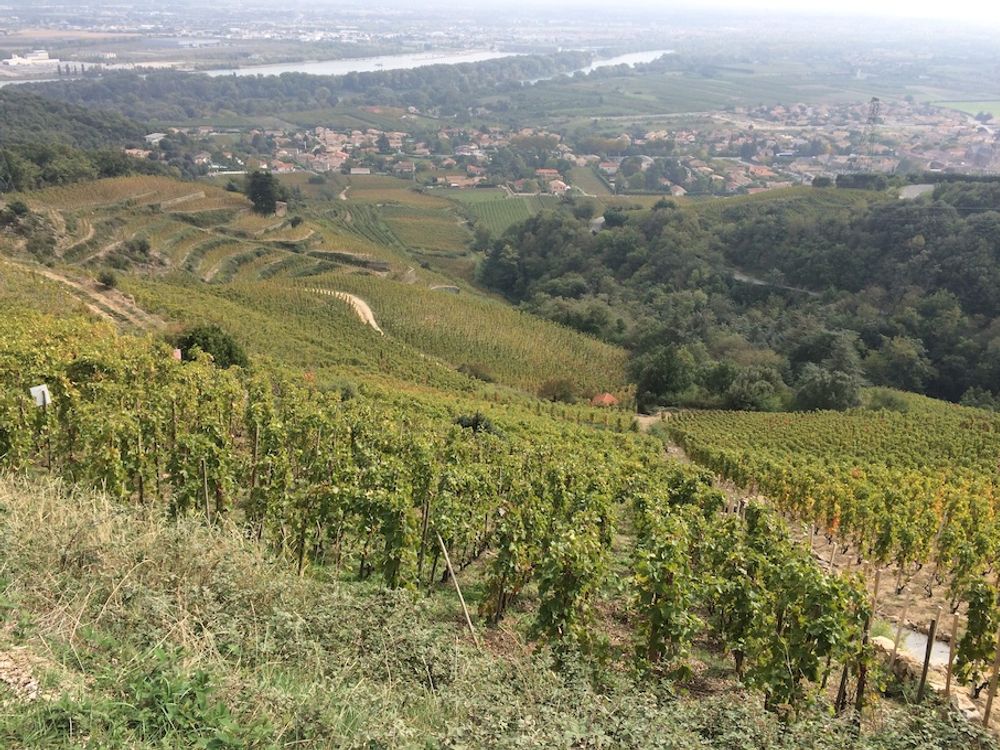
Colombo vineyard looking down on Cornas and the river Rhône
Before the tasting Colombo speaks at length about one of his pet hates which is irrigation.
Although vignerons are allowed to irrigate in the Rhône during hot spells it is becoming increasingly common, particularly in the Southern Rhône where it can help combat water stress, which in turn leads to better ripeness, balanced acidity and tempered alcohol levels in the wines. But Colombo sees this a bit like like cheating, a dilution of terroir, and a practice which has a detrimental effect on the wines – lessening the floral register of the wines and some of the mineral complexity.
“With less irrigation you get more violets and jasmine, but with irrigation you have more confiture it is completely different,” he says, “As for Hermitage it is less floral, you don’t smell anything in Hermitage. And the top end wines that use irrigation – the critics don’t ever mention it.”
Talk turns full circle back to the disastrously wet 2002 vintage.
“2002 was a disaster it rained everywhere, Cornas, Côte Rôtie disaster! but when Robert Parker arrived in ’02 he went to Chapoutier who told him it is a disaster in the Rhône everywhere except for Hermitage, so then Parker writes that in ’02 there was no rain in Hermitage!”
So how were the Colombo 2020 wines tasting?
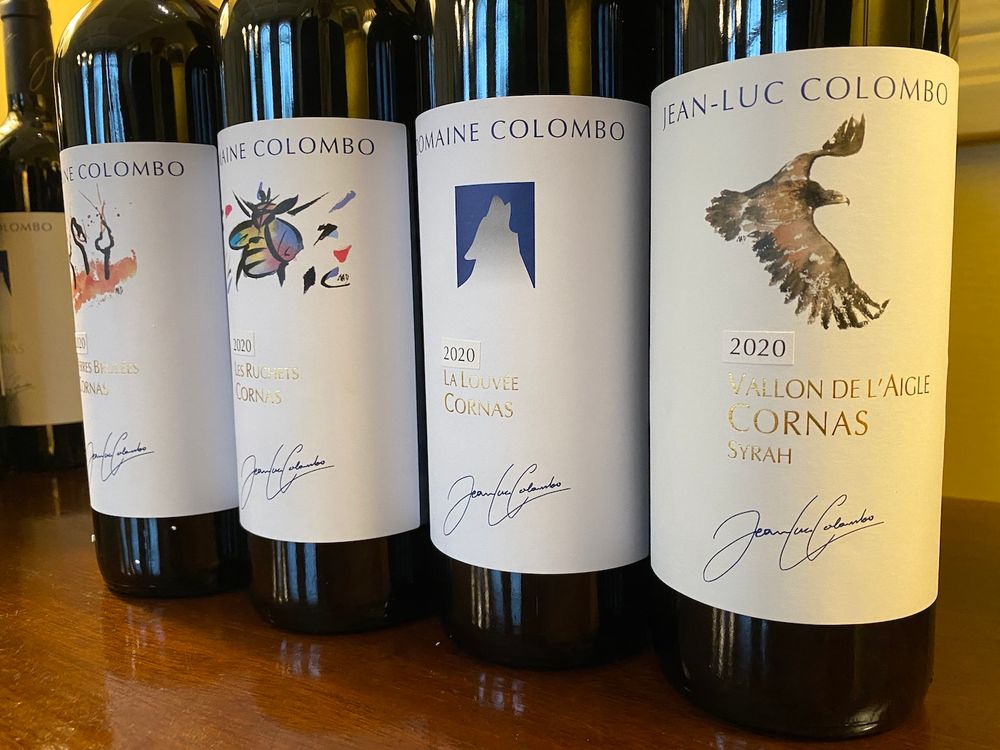
Cornas Terres Brûlées 2020
Translated as ‘The Roasted Earth’ this pretty example of Cornas is a blend of young and old vines (20-60 year old) from a variety of plots. Although this sample is halfway through its two year sojourn in oak, the first sniff is intoxicating, hedonistic and exciting. Very deep purple, the bouquet is concentrated and pure, with notes of fresh violets, juniper, liquorice. Fresh, mouth-filling with brambles and raspberries, a streak of blood orange acidity. The power and the purity is immense but you could drink this here and now if desired.
Cornas Les Ruchets 2020
The signature wine of the estate, a ‘vin de garde’ made from 90 year-old vines grown on East-facing slopes with a granitic sub-soil. To taste, the wine is instantly more elegant and refined than Terres Brûlées with a black fruit rather than red fruit profile. The nose offers small black cherries and savoury notes of rosemary, Chinese ink and resin. The mouthfeel has ripe, silky tannins, a sense of stone and mineral, terrific concentration and energy, with its pure flavoursome power gripping on the finish. Jean-Luc confesses to enjoying this paired with duck breast rubbed in spices which is exactly what we have as a main course with a 2018 of this wine and a 2018 of the Terres Brûlées.
Cornas La Louvée 2020
Translated as the ‘she-wolf’ this cuvée is made from vines up to 70 years old grown in the middle of a granitic South-East facing slope that is surrounded by cedar and oak forest. The wine is heavily textured, intense with the power turned up a notch. The mineral component is also one of the most distinguishing facets of this wine that is built for the long haul. The bouquet is floral with violets, raspberry, blueberry a touch of bacon perhaps; the mouthfeel has more presence and grip with some black notes of tapenade, liquorice and chocolate creeping in.
Cornas Le Vallon de l’aigle 2020
Only made in outstanding vintages this 2000-bottle cuvée (translated as the Valley of the Eagle) comes from a very steep South-facing slope with vines aged 65-70 years. The wine really does need some years on the clock to fully appreciate it but the complexity and the ‘grand vin breeding’ of the terroir is evident already. The bouquet offers violets and raspberry but there is a wonderful note of incense here, with hints of tobacco. On the palate the wine is clearly a step up from the other wines – silky, very fine texture, inky and with terrific intensity. Gorgeous balance.
Although these Cornas 2020s were the main attraction we also tasted some wines with age. Cornas La Louvée 2016 comes from a good vintage which drank well although the nose was unusual – the easy-drinking palate offered espresso, chocolate, mint, violets and spice, also a whiff of smoke and the skin of a cigar. Cornas Les Ruchets 2014 was the most intense wine of the tasting, complex, quite jammy, with cassis, crème de mure, rich, beef tartare with prodigious tannins and acidity.
All of the wines are 100% Syrah, the 2020 samples being unfined and unfiltered.
Jean-Luc Colombo Cornas 2020 wines are being imported into the UK by Mentzendorff, which is a supplier partner of The Buyer. To discover more about them click here.
